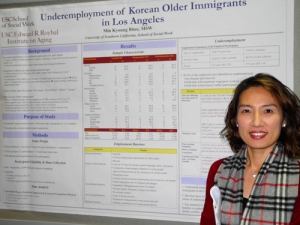Doctoral Student Finds Many of L.A.’s Older Koreans Underemployed
January 05, 2012 / by Vincent Lim- Research
Min-Kyoung Rhee, a doctoral student at the USC School of Social Work, first became interested in the employment issues facing older adults when she was living in South Korea during the Asian financial crisis in 1997.
“I observed massive unemployment and involuntary early retirement for people in their mid-40s and 50s,” she said.
Rhee wound up conducting her doctoral research on the employment plight of older Koreans—but in a different country than she expected—when she came to the United States to pursue her PhD. Many Koreans migrated to the United States in the 1980s, but immigration began to decline in the early 1990s, only to pick up again the latter part of the decade during Asia’s economic meltdown. Large concentrations of Koreans now live in major cities such as New York, Chicago and Los Angeles, where she conducted her research.
The results of Rhee’s study, which she presented at the 64th Annual Gerontological Society of America (GSA) Scientific Meeting in Boston in November 2011, suggest a large number of older Korean immigrants in Los Angeles are underemployed. Many of the participants in her study indicated they were working part-time out of economic necessity, and those who did work full-time were employed in minimum-wage jobs that did not reflect their career or educational experience.
Rhee was one of three PhD students to receive a Roybal Institute Fellowship Award from the USC Edward R. Roybal Institute on Aging to present at the GSA Scientific Meeting, the foremost gathering of researchers in the field of aging from both the United States and the world.
While Rhee received guidance from Iris Chi, the school’s Chinese American Golden Age Association/Frances Wu Chair for the Chinese Elderly, she found her topic to be under-researched.
“Not a lot of attention has been paid to the employment issues of older ethnic minority immigrants,” Rhee said. “Moreover, research on the employment of older adults often does not include older Asian immigrants despite the fact that older Asian adults are the most rapidly expanding group in the U.S. and older Asian immigrants represent the second largest share of older immigrants after Latinos.”
She discovered an even greater dearth of literature that focuses specifically on the financial plight of older Korean immigrants. Rhee adds this is critical to understanding older Asians in the United States are not a homogeneous population.
“It is significant for the studies to be more ethnic-specific because when older Asian immigrants are treated as an aggregate, it may not only misrepresent the group, but the results are unlikely to apply to any one group,” Rhee said.
For example, she said the economic status of older Koreans resembles that of older African-Americans, whereas the financial profile of older Japanese resembles that of older Caucasians.
From her interviews in the Koreatown area of Los Angeles, Rhee also learned more about the personal struggles of older Koreans than she could have ever learned from pouring over hundreds of scientific studies.
“At first, I was concerned they would not share their stories much, but they sympathized strongly with the significance of the topic and were very supportive in telling their stories,” Rhee said. “They expressed that it was their first time to share the stress and pressure coming from not having a job, and just by talking with others, it relieved some of their stress.”
To reference the work of our faculty online, we ask that you directly quote their work where possible and attribute it to "FACULTY NAME, a professor in the USC Suzanne Dworak-Peck School of Social Work” (LINK: https://dworakpeck.usc.edu)
